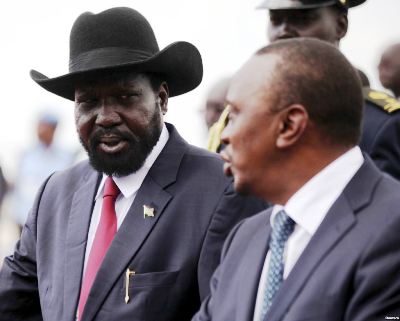Juba welcomes Kenya’s decision on seven SPLM leaders
February 10, 2014 (JUBA) – The South Sudanese government on Monday welcomed Kenya’s decision not to allow the seven politicians currently on bail within its territory to take part in peace talks scheduled for Tuesday in Addis Ababa, Ethiopia.

Unango said any movement of these officials outside Kenya before they are cleared undermines the basis of understanding, which led to their release two weeks ago.
Minister Unango, however, declined to comment on whether the government would seek an explanation from the Kenyan government should the later succumb to the international pressure demanding participation of the former detainees in the talks.
Analyst and human right advocacy groups on Monday expressed serious concern over Kenya’s decision, arguing it to demonstrate principle of neutrality in the conflict.
“The people of South Sudan feel the government in the region which has tried to play principle of neutrality is the government of Ethiopia and Kenya, and they expect these governments to maintain these positions,” said Anthony Sebit, a political analyst.
Actually they [Kenya] were the ones which came out with the initiative to reconcile and address the current conflict in the country, he added.
The South Sudanese analyst advised the Kenyan government not to falter its stance.
“According to the reading, the change in the position of the government will have some impacts on the negotiation. Many are therefore feeling that it would not be right if the Kenyan government is tempted to abandon the principle of neutrality in such matters,” he emphasised.
Meanwhile, the government confirmed on Monday its delegation arrived in Addis Ababa on Sunday for a fresh round of peace talks with opposition representatives.
An official, however, said the government delegation were yet to receive the agenda of negotiation from the Intergovernmental Authorities on Development (IGAD) mediators. The government delegation is headed by ex-foreign minister Nhial Deng Nhial with information minister, Michael Makuei Lueth as its official spokesperson.
Other members on the government delegation, include the leader of the opposition Sudan People’s Liberation Movement for Democratic Change, Lam Akol Ajawin and Joseph Ukel, leader of Sudan African National Union who is representing all the other remaining political parties not on the table.
Initially viewed as negotiations between the two warring camps within the ruling party leadership, opposition figures, religious leaders and civil society groups have argued their inclusion was necessary. They claim issues to be discussed at the talks were of a national nature.
The first round ended with cessation of hostilities and the status of political detainees’ agreements, seven of whom have so far been released, while four others remains in detention on treason charges.
A diplomat told Sudan Tribune on Monday that the government’s lead negotiator was due to meet IGAD mediators to find out the schedules of negotiations as well as agenda for the discussions.
Members of the opposition delegation, according to the mediators, were expected in Addis Ababa on Monday. A rebel source, however, said some members of the delegation had arrived in Ethiopia, but it was not yet clear if Taban Deng Gai who leads rebel delegation was among them.
The two South Sudanese warring sides appear far from reaching any compromise.
While the regime appears interested in the talks focusing on resolving the differences, the opposition demands are expected to include an agreement on a transition that excludes President Salva Kiir from power.
(ST)
